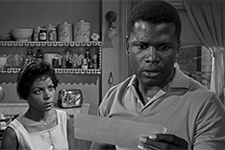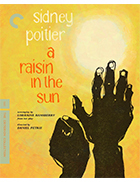A Raisin in the Sun
|  The title of Lorraine Hansberry’s groundbreaking 1959 play A Raisin in the Sun, which she adapted into the 1961 film directed by Daniel Petrie, comes from Langston Hughes’s poem “Harlem,” which asks the pointed question, “What happens to a dream deferred?” “Does it dry up / like a raisin in the sun?” Hughes asks, “Or fester like a sore—/and then run?” Hughes’s poem is short, direct, and packs a punch, and you can see why Hansberry would be drawn to its wording, not just for her play’s title, but for its dramatic essence. A Raisin in the Sun is, at its core, about the frustrations that come with having dreams that are either out of reach or must be constantly put off to attend to more mundane realities, and part of the play’s brilliance is the way it conveys the vast range of emotional fallout from deferred dreams—the sense of withering, and of festering, and, as Hughes ends the poem, of exploding. The story centers on the Youngers, a working-class African-American family living in a crowded, two-bedroom apartment on the South Side of Chicago. Each member of the family is struggling in his or her own way against the intertwined economic and racial oppression that defines their existence. The central couple is Walter Lee (Sidney Poitier), who works as a chauffeur, and his wife Ruth (Ruby Dee), who works as domestic help. They have a young son named Travis (Steven Perry) for whom Walter Lee yearns to give a better life, one that he knows he cannot achieve as a chauffeur. He has hatched an investment plan with several friends to open a liquor store, but he needs the money from a soon-to-be-delivered life insurance check from his father, who recently passed away. That check goes to his mother, Lena (Claudia McNeil), with whom they live along with his younger sister Beneatha (Diana Sands), who yearns to go to medical school and therefore needs the insurance money for tuition. Lena is against the idea of Walter Lee opening a liquor store, while he is determined that it will offer them a ticket out of constant economic struggle. The story is one of conflicting desires among a group of family members who all want different variations of the same thing. Walter Lee longs for the upward mobility that he sees coming so easily to white men, which feeds his frustration and sense of emasculation. He lashes out at everyone around him and descends into self-destructive drinking, yet Poitier keeps him sympathetic and relatable, even when he is at his worst. Ruth is a study in patience and endurance, while Lena represents a strong matriarch who has endured racial strife and economic desperation and is therefore less likely to be lulled into chasing false dreams. Director Daniel Petrie, who was helming his second feature film after a decade of directing television series, including episodes of the prestigious anthology dramas The United States Steel Hour, Goodyear Playhouse, and The DuPont Show of the Month, stays largely out of the way and allows the fine cast, all of whom had appeared on the Broadway stage together, to manage the drama. He allows much of the action to unfold in long takes that emphasize the cramped space of the Younger apartment, but in such a way that avoids a sense of “canned theater.” The film’s most pointed and painful reality is revealed when Lena decides to buy the family a house in a white suburban neighborhood, only to be confronted by the cordial, but insidious head of the neighborhood association (John Fiedler) who arrives to tell them ever-so-politely that they are not wanted (this was something that Hansberry had experienced directly, as her family integrated a white neighborhood in the late 1930s under threat of violence and her father was involved in a case challenging racial housing restrictions that went all the way to the Supreme Court). Much of the film’s second half hinges on the stinging reality of integration and how African-American families were so often forced to defer their own dreams simply because white people feared that would mean losing theirs, a sensibility that, unfortunately, appears to be on the rise today. And that is why A Raisin in the Sun retains much of its dramatic and social power so many decades later: It hits on an intertwined set of realities involving family conflict and deeply embedded social racism that still affects us today. The Youngers are very much a portrait of the black family at the dawn of the Civil Rights era, but their struggles and successes are still pertinent. Some dreams, unfortunately, are still being deferred.
Copyright © 2018 James Kendrick Thoughts? E-mail James Kendrick All images copyright © The Criterion Collection | |||||||||||||||||||||||||||||||
Overall Rating: 


 (3.5)
(3.5)


